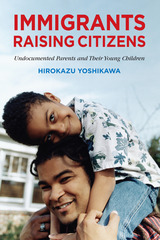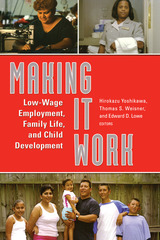599 scholarly books by Russell Sage Foundation and 5
have author last names that start with Y
599 scholarly books by Russell Sage Foundation and 5
599 scholarly books by Russell Sage Foundation
5 have author last names that start with Y have author last names that start with Y
5 have author last names that start with Y have author last names that start with Y

Closed Doors, Opportunities Lost
The Continuing Costs of Housing Discrimination
John Yinger
Russell Sage Foundation, 1995
"Yinger writes as if four decades of protest and progressive legislation have barely altered the terrain upon which minority Americans struggle for equality. He's right....Yinger figures that housing discrimination costs black homebuyers $5.7 billion and Hispanic homebuyers $3.4 billion every three years." —Washington Monthly Nearly three decades after the passage of the Fair Housing Act, illegal housing discrimination against blacks and Hispanics remains rampant in the United States. Closed Doors, Opportunities Lost reports on a landmark nationwide investigation of real estate brokers, comparing their treatment of equally qualified white, black, and Hispanic customers. The study reveals pervasive discrimination. Real estate brokers showed 25 percent fewer homes to the minority buyers, and loan agencies were 60 percent more likely to turn down minority applicants. Realtors and lenders also charged higher prices to minority buyers, withheld or gave insufficient financial and application information, and showed them homes only in non-white neighborhoods. Residents of minority neighborhoods faced further difficulties trying to sell their homes or obtain housing credit and homeowner's insurance. Economist John Yinger provides a lucid account of these disturbing facts and shows how deeply housing discrimination can affect the living conditions, education, and employment of black and Hispanic Americans. Deprived of residential mobility and discouraged from owning their own homes, many minority families are unable to flee stagnant or unsafe neighborhoods. Two thirds of black and Hispanic children are concentrated in high-poverty schools where educational achievement is low and dropout rates are high. The employment possibilities for minority job-seekers are diminished by the ongoing movement of jobs from the cities to the suburbs, where housing discrimination is particularly severe. Altogether, these effects of housing discrimination create a vicious cycle—discrimination imposes social and economic barriers upon blacks and Hispanics, and the resulting hardships fuel the prejudice that leads whites to associate minorities with neighborhood deterioration. Closed Doors, Opportunities Lost provides a history of fair housing and fair lending enforcement and joins the intense debate about integration policy. Yinger proposes a bold, comprehensive program that aims not only to end discrimination in housing and mortgage markets but to reverse their long-term effects by stabilizing poorer neighborhoods and removing the stigma of integration. He urges reforms to strengthen the enforcement powers of HUD and other agencies, provide funding for poor and integrated schools, encourage local housing and race-counseling programs, and shift income tax breaks toward low-income homebuyers. Closed Doors, Opportunities Lost provides valuable insight into the causes, extent, and consequences of housing discrimination—undeniably one of America's most vexing and important problems. This volume speaks directly to the ongoing debate about the nature and causes of poverty and the underclass, civil rights policy, the Community Reinvestment Act, and the plight of our nation's cities.
[more]

Immigrants Raising Citizens
Undocumented Parents and Their Children
Hirokazu Yoshikawa
Russell Sage Foundation, 2011
An in-depth look at the challenges undocumented immigrants face as they raise children in the U.S. There are now nearly four million children born in the United States who have undocumented immigrant parents. In the current debates around immigration reform, policymakers often view immigrants as an economic or labor market problem to be solved, but the issue has a very real human dimension. Immigrant parents without legal status are raising their citizen children under stressful work and financial conditions, with the constant threat of discovery and deportation that may narrow social contacts and limit participation in public programs that might benefit their children. Immigrants Raising Citizens offers a compelling description of the everyday experiences of these parents, their very young children, and the consequences these experiences have on their children's development. Immigrants Raising Citizens challenges conventional wisdom about undocumented immigrants, viewing them not as lawbreakers or victims, but as the parents of citizens whose adult productivity will be essential to the nation's future. The book's findings are based on data from a three-year study of 380 infants from Dominican, Mexican, Chinese, and African American families, which included in-depth interviews, in-home child assessments, and parent surveys. The book shows that undocumented parents share three sets of experiences that distinguish them from legal-status parents and may adversely influence their children's development: avoidance of programs and authorities, isolated social networks, and poor work conditions. Fearing deportation, undocumented parents often avoid accessing valuable resources that could help their children's development—such as access to public programs and agencies providing child care and food subsidies. At the same time, many of these parents are forced to interact with illegal entities such as smugglers or loan sharks out of financial necessity. Undocumented immigrants also tend to have fewer reliable social ties to assist with child care or share information on child-rearing. Compared to legal-status parents, undocumented parents experience significantly more exploitive work conditions, including long hours, inadequate pay and raises, few job benefits, and limited autonomy in job duties. These conditions can result in ongoing parental stress, economic hardship, and avoidance of center-based child care—which is directly correlated with early skill development in children. The result is poorly developed cognitive skills, recognizable in children as young as two years old, which can negatively impact their future school performance and, eventually, their job prospects. Immigrants Raising Citizens has important implications for immigration policy, labor law enforcement, and the structure of community services for immigrant families. In addition to low income and educational levels, undocumented parents experience hardships due to their status that have potentially lifelong consequences for their children. With nothing less than the future contributions of these children at stake, the book presents a rigorous and sobering argument that the price for ignoring this reality may be too high to pay.
[more]

Making It Work
Low-Wage Employment, Family Life, and Child Development
Hirokazu Yoshikawa
Russell Sage Foundation, 2006
Low-skilled women in the 1990s took widely different paths in trying to support their children. Some held good jobs with growth potential, some cycled in and out of low-paying jobs, some worked part time, and others stayed out of the labor force entirely. Scholars have closely analyzed the economic consequences of these varied trajectories, but little research has focused on the consequences of a mother's career path on her children's development. Making It Work, edited by Hirokazu Yoshikawa, Thomas Weisner, and Edward Lowe, looks past the economic statistics to illustrate how different employment trajectories affect the social and emotional lives of poor women and their children. Making It Work examines Milwaukee's New Hope program, an experiment testing the effectiveness of an anti-poverty initiative that provided health and child care subsidies, wage supplements, and other services to full-time low-wage workers. Employing parent surveys, teacher reports, child assessment measures, ethnographic studies, and state administrative records, Making It Work provides a detailed picture of how a mother's work trajectory affects her, her family, and her children's school performance, social behavior, and expectations for the future. Rashmita Mistry and Edward D. Lowe find that increases in a mother's income were linked to higher school performance in her children. Without large financial worries, mothers gained extra confidence in their ability to parent, which translated into better test scores and higher teacher appraisals for their children. JoAnn Hsueh finds that the children of women with erratic work schedules and non-standard hours—conditions endemic to the low-skilled labor market—exhibited higher levels of anxiety and depression. Conversely, Noemi Enchautegui-de-Jesus, Hirokazu Yoshikawa, and Vonnie McLoyd discover that better job quality predicted lower levels of acting-out and withdrawal among children. Perhaps most surprisingly, Anna Gassman-Pines, Hirokazu Yoshikawa, and Sandra Nay note that as wages for these workers rose, so did their marriage rates, suggesting that those worried about family values should also be concerned with alleviating poverty in America. It is too simplistic to say that parental work is either "good" or "bad" for children. Making It Work gives a nuanced view of how job quality, flexibility, and wages are of the utmost importance for the well-being of low-income parents and children.
[more]

Trusteeship and the Management of Foundations
Donald Young
Russell Sage Foundation, 1969
Offers two extended essays by two eminent social scientists on trusteeship and foundation management. The first essay, by Dr. Moore, reflects the author's long interest in the relations between the economy and the society. He examines trusteeship as a combination and interrelation of three main principles: custodial relations, lay control, and the law of trusts. Dr. Young's essay, the longer and more pragmatic of the two, applies these principles to the actual management of philanthropic foundations. Dr. Young draws upon his experience as a president of two social science foundations in his discussion of both the old and new "proprietary" foundations.
[more]

Behavioral Sciences and the Mass Media
Frederick T. C. Yu
Russell Sage Foundation, 1968
Presents papers which were discussed at the Arden House Conference—a conference held to establish a working relationship between sociologists at the Russell Sage Foundation and journalists of the Graduate School of Journalism of Columbia University. Both behavioral science and journalism have for a long time been concerned with some of the same major national social problems—juvenile delinquency, urban problems, race and minority group relations, international tensions, and labor relations. These papers touch on some of the barriers to communication and point to possible ways of breaking through those barriers.
[more]
READERS
Browse our collection.
PUBLISHERS
See BiblioVault's publisher services.
STUDENT SERVICES
Files for college accessibility offices.
UChicago Accessibility Resources
home | accessibility | search | about | contact us
BiblioVault ® 2001 - 2024
The University of Chicago Press









